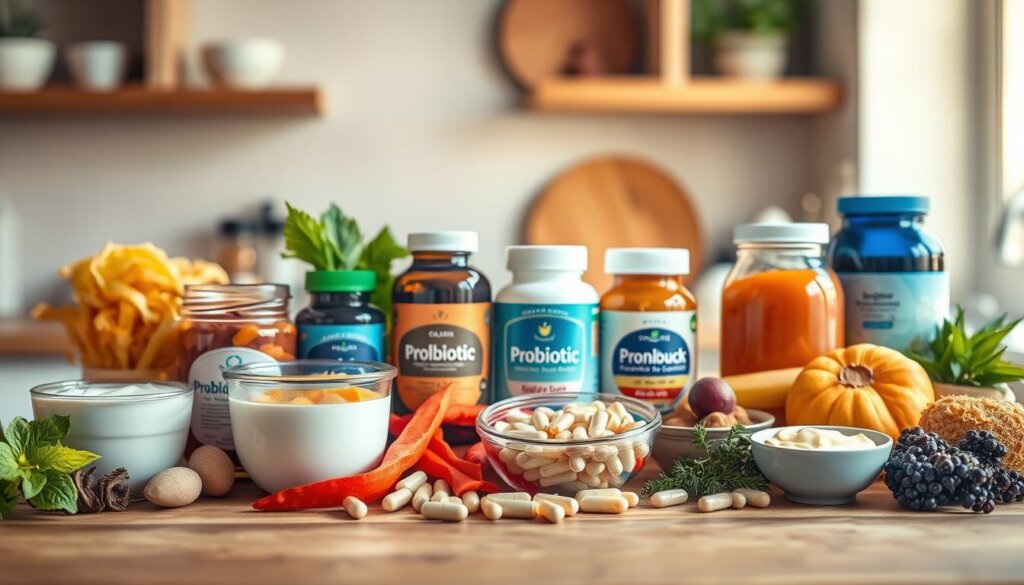With over 1,000 probiotic products crowding Malaysian pharmacies and health stores, many people unknowingly waste money on supplements that don’t align with their needs. These live microorganisms offer powerful benefits for digestion and immunity – but only when matched correctly to individual health goals.
The Wellness Group team frequently encounters clients frustrated by conflicting claims about Lactobacillus strains or CFU counts. As research from the Cleveland Clinic confirms, effective probiotic use requires understanding three key factors: strain specificity, product quality, and personal health status.
This guide simplifies the selection process using evidence-based criteria. Readers will learn to:
- Identify products with clinically studied bacterial strains
- Decode supplement labels for potency and stability
- Address specific concerns like those detailed in our digestive wellness blog
Wellness Group’s nutrition experts are available via WhatsApp (+60123822655) Monday-Friday 9:30am-6:30pm to help Malaysians navigate this complex landscape. Proper probiotic selection creates measurable improvements in gut health – let’s make those trillions of microorganisms work for you, not against you.
Key Takeaways
- Probiotic effectiveness depends on matching strains to specific health needs
- Quality indicators include CFU count and third-party testing
- Gut health improvements may take 2-4 weeks of consistent use
- Initial bloating often signals microbiome adjustment
- Professional guidance ensures optimal results
Introduction to Probiotics and Wellness Group
Probiotics are living microorganisms that create tangible health improvements when consumed properly. Unlike standard vitamins, these tiny allies – including bacteria like Lactobacillus and yeasts such as Saccharomyces boulardii – actively reshape gut environments. Research shows they strengthen intestinal barriers and crowd out harmful pathogens within weeks.
Three Core Types of Beneficial Microbes
These microorganisms fall into distinct categories:
- Bacteria: Dominant strains like Bifidobacterium support digestion
- Yeasts: Certain fungi combat diarrhea effectively
- Phages: Specialized viruses target specific harmful bacteria
Wellness Group’s Personalized Approach
Our team helps Malaysians select prebiotic and probiotic combinations based on individual needs. With 70% of immune cells residing in the gut, proper microbial balance impacts everything from nutrient absorption to mood regulation.
“Effective probiotic use isn’t about chasing high CFU counts – it’s matching verified strains to your unique biology.”
Reach Wellness Group’s experts at +60123822655 via WhatsApp weekdays 9:30am-6:30pm or Saturdays 10am-5pm. We prioritize clinically validated solutions over generic recommendations, ensuring your gut microbiome gets precisely what it needs.
Understanding the Role of Probiotics in Gut Health
The human gut functions as a sophisticated ecosystem housing trillions of microorganisms. This bustling community – known as the gut microbiome – works tirelessly to break down food, extract nutrients, and communicate with bodily systems. When balanced, these microbes act as frontline defenders against invaders while producing essential compounds for overall wellness.

Why Microbial Harmony Matters
A healthy gut thrives on diversity. Beneficial Bifidobacterium and Lactobacillus strains keep harmful bacteria in check, preventing overgrowth that leads to discomfort. Research reveals three critical functions:
- Strengthening intestinal walls to block toxins
- Producing infection-fighting mucous layers
- Regulating 70% of immune system activity
Imbalances often trigger issues beyond bloating or irregular digestion. Poor microbial diversity correlates with weakened defenses against pathogens and chronic inflammation. Specific strains in quality probiotics help restore equilibrium, as detailed in our guide to the health benefits of probiotics.
Clinical studies highlight probiotics’ effectiveness for:
- Reducing ulcerative colitis flare-ups
- Shortening infectious diarrhea duration
- Easing irritable bowel syndrome symptoms
“Microbiome support isn’t one-size-fits-all,” notes a Wellness Group nutritionist. “Understanding your unique gut profile ensures targeted solutions.” Regular consumption of researched strains creates lasting improvements – but only when matched to individual biological needs.
How to choose a probiotic?
Navigating probiotic labels feels like decoding a scientific formula for many Malaysians. The key lies in understanding two critical elements: verified strain information and precise dosage measurements.
Evaluating Product Labels and CFU Counts
Look for “live and active cultures” declarations first. Colony-forming units (CFU) indicate viable microorganisms – aim for products with 1-10 billion CFU per serving. Higher numbers don’t guarantee better results, as research shows specific doses work best for particular health concerns.
Labels should list full strain names like Lactobacillus rhamnosus GG or Bifidobacterium lactis HN019. These identifiers matter because different strains within the same species perform unique functions. A product claiming “10 strains” without proper naming lacks scientific backing.
Identifying the Right Probiotic Strains
Evidence-based selection trumps generic options. For digestive comfort, studies support Lactobacillus rhamnosus GG, while Bifidobacterium lactis HN019 aids regularity. Always match strains to your primary health goal rather than choosing broad-spectrum blends.
Third-party testing seals help verify label accuracy. Reputable brands disclose storage requirements and expiration dates – crucial details ensuring live cultures remain effective. Avoid products making vague claims like “supports gut health” without citing specific research.
“Strain specificity separates science from marketing. Always cross-check labels against clinical studies.”
Practical Tips for Incorporating Probiotics into Your Daily Routine
Building a probiotic-rich routine starts with smart choices between whole foods and supplements. Both options support gut health, but they work differently in the body. Let’s explore how to harness their benefits effectively.

Food First: Nature’s Probiotic Powerhouses
Fermented foods often outperform supplements because they deliver live cultures plus nutritional co-factors. Consider these options:
- Yogurt: Contains Lactobacillus bulgaricus for lactose digestion
- Kimchi: Provides fiber-rich cabbage with immune-boosting bacteria
- Tempeh: Malaysian favorite offering complete protein and gut-friendly microbes
The fermentation process creates short-chain fatty acids that strengthen intestinal walls. Regular consumption of these foods may lower inflammation markers by 12-15% in healthy adults.
When Supplements Make Sense
Those with dietary restrictions or specific health needs might prefer probiotic supplements. Capsules and powders offer concentrated doses of particular strains like Bifidobacterium longum for stress-related digestion issues.
Key considerations for supplements:
- Check for third-party testing seals
- Opt for delayed-release capsules if taking with meals
- Store refrigerated products properly
“Consistency beats perfection. Even small daily portions of fermented foods create lasting microbiome changes.”
Pair probiotic-rich items with prebiotic fibers from bananas or oats for enhanced effects. Start with one serving daily, gradually increasing as your gut adjusts. Most people notice improved regularity within 3-4 weeks of regular use.
Expert Considerations for Probiotic Use in Malaysia
Malaysia’s tropical climate and diverse cuisine create unique challenges for maintaining gut health. Local favorites like nasi lemak and rendang can strain digestion, while heat and humidity affect probiotic stability. These factors make strain selection and storage critical for effectiveness.
Research-Backed Advice and Safety Guidelines
Temporary bloating or gas often signals beneficial microbial activity. These effects typically fade within 7-10 days as gut balance improves. However, certain groups should avoid supplements:
| Condition | Recommendation | Beneficial Strains |
|---|---|---|
| Irritable Bowel Syndrome | Use under medical supervision | Bifidobacterium infantis |
| Ulcerative Colitis | Specific formulations only | Escherichia coli Nissle |
| Antibiotic Recovery | Start after treatment | Saccharomyces boulardii |
Studies show specific strains reduce inflammation markers by 18-22% and support immune function. Those with autoimmune conditions or recent surgeries should consult doctors first.
When to Consult a Healthcare Provider
Seek professional advice if experiencing:
- Persistent diarrhea beyond 72 hours
- Unexpected weight changes
- Fever during probiotic use
Wellness Group’s nutritionists tailor recommendations to Malaysia’s food culture and health trends. For personalized care strategies, contact experts at +60123822655 weekdays 9:30am-6:30pm. Probiotics work best when aligned with individual biology and lifestyle needs.
Conclusion
Selecting the right probiotic becomes simpler when focusing on proven science rather than trends. Prioritize products listing researched strains like Lactobacillus rhamnosus GG alongside verified CFU counts. Quality manufacturing standards and third-party testing separate effective options from marketing hype.
Natural sources often outperform supplements. Fermented foods like tempeh or yogurt deliver live cultures alongside essential nutrients. For targeted support, consult professionals to match strains to specific wellness goals rather than generic solutions.
Consistency matters more than quantity. Gradual introduction allows the gut microbiome to adapt while minimizing temporary bloating. Pair probiotic-rich choices with fiber-filled meals for amplified benefits – improvements in digestion and immunity typically emerge within 3-4 weeks.
Wellness Group’s experts help Malaysians navigate daily probiotic use safely and effectively. Reach our team at +60123822655 weekdays 9:30am-6:30pm or Saturdays 10am-5pm. Together, we’ll build a gut-friendly routine tailored to your unique biology and lifestyle.
FAQ
What does CFU mean on probiotic labels?
CFU stands for Colony-Forming Units, indicating the number of live microorganisms in each dose. Products like Culturelle or Renew Life list CFU counts, typically ranging from 1 billion to 100 billion. Higher CFUs aren’t always better—research suggests matching the count to specific health needs, like 10–20 billion for general gut health.
Can probiotics help with irritable bowel syndrome (IBS)?
Certain strains, such as Bifidobacterium infantis 35624 (found in Align), may reduce bloating and discomfort linked to IBS. Studies show mixed results, so consulting a gastroenterologist or dietitian ensures personalized recommendations based on symptoms and medical history.
Are fermented foods as effective as supplements?
Foods like kimchi, kefir, and Activia yogurt provide natural probiotics but often lack strain-specific labeling. Supplements like Garden of Life offer targeted formulas. Combining both supports gut diversity, but those with severe imbalances may benefit more from researched supplements.
How long does it take for probiotics to work?
Effects vary—some notice changes in digestion within days, while immune or weight-related benefits may take weeks. Consistency matters. If symptoms like gas persist after 4–6 weeks, switching strains or consulting a healthcare provider is advised.
Can probiotics interact with medications?
Some strains might affect immunosuppressants or antibiotics. For example, Saccharomyces boulardii can reduce antibiotic-associated diarrhea but may interfere with antifungal drugs. Always inform doctors about probiotic use to avoid adverse interactions.
Are probiotics safe during pregnancy?
Certain strains, like Lactobacillus rhamnosus GG, are generally considered safe, but limited research exists. Pregnant individuals should consult obstetricians before using products like MegaFood Baby & Me 2 to ensure compatibility with prenatal care plans.
Do probiotics require refrigeration?
Shelf-stable options, such as Florastor, use strains that survive room temperature. Others, like VSL#3, need refrigeration to maintain potency. Always check storage instructions—improper handling can reduce live microorganism counts.






